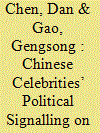|
|
|
Sort Order |
|
|
|
Items / Page
|
|
|
|
|
|
|
| Srl | Item |
| 1 |
ID:
192187


|
|
|
|
|
| Summary/Abstract |
In China, celebrities can dominate public discourse and shape popular culture, but they are under the state's close gaze. Recent studies have revealed how the state disciplines and co-opts celebrities to promote patriotism, foster traditional values and spread political propaganda. However, how do celebrities adapt to the changing political environment? Focusing on political signalling on the social media platform Sina Weibo, we analyse a novel dataset and find that the vast majority of top celebrities repost from official accounts of government agencies and state media outlets, though there are variations. Younger celebrities with more followers tend to repost from official accounts more often. Celebrities from Taiwan tend to repost less than those from the mainland and Hong Kong, despite being subject to the same rules. However, the frequent political signalling by the most influential celebrities among younger generations suggests that the state has co-opted celebrity influence on social media to broadly promote its political objectives.
|
|
|
|
|
|
|
|
|
|
|
|
|
|
|
|
| 2 |
ID:
151580


|
|
|
|
|
| Summary/Abstract |
Despite strict state controls, negative news about local officials is reported in China. Faced with political constraints and the incentive and pressure to earn profits, municipal television news programmes have developed and adopted the life news model (minsheng xinwen), which aims to help citizens solve problems. The production process of this news model has transformed the political role of the broadcast media at the local level. Many life news reports focus on disputes between citizens and local officials. Thus, addressing citizen grievances essentially facilitates public service provision. Based on an ethnographic case study of a municipal television news programme, this article finds that the production process of life news reports can facilitate public service provision by correcting local officials’ behaviour, regardless of whether the news reports are eventually broadcast. This unintended role is a result of the power negotiation between local officials and journalists who face immense commercial pressure.
|
|
|
|
|
|
|
|
|
|
|
|
|
|
|
|
| 3 |
ID:
147311


|
|
|
|
|
| Summary/Abstract |
Studies on Chinese politics frequently utilize the safety valve analogy to describe various political decisions that allow space for feedback and challenges. Drawing upon these empirical studies and the theoretical literature on institution, authoritarianism, and democratization, this review essay delineates the logic of the safety valve strategy and how it fits into the scheme of prolonging authoritarian rule. It identifies the use of informal and temporary measures to appease aggrieved citizens as the central feature of the safety valve strategy, complementing formal means such as institutional reform. The informal and temporary measures are different from the patronage system, and credibility is not necessarily a prerequisite for effectiveness. The safety valve strategy contributes to authoritarian resilience by relieving public frustration, reducing the propensity to contentious politics, and in some cases enabling the government to collect information on potential opposition groups or emerging problems.
|
|
|
|
|
|
|
|
|
|
|
|
|
|
|
|
| 4 |
ID:
158657


|
|
|
|
|
| Summary/Abstract |
While mass mobilization and political campaigns were the main administrative tools for policy implementation in China during the Maoist era (1949–1976), they continued to a lesser extent into the reform period. In the Maoist era, these campaigns shaped the social and economic life of residents and government officials. However, the use of campaigns and mass mobilization diminished in the 1980s and 1990s in favor of modern administrative procedures. Instead, narrower mobilization of cadres and campaign-style policy pushes became part of the available administrative tools for policy implementation. The Chinese Communist Party (CCP) sometimes reverts to campaign-style methods to deal with uneven implementation and local government foot dragging. The use of policy pushes suggests an elastic form of implementation where an intense wave of central leadership policy commitment can stretch down to the local level for a short period of time and then it recedes. Looking at the single child policy (birth control measures) from the 1980s to the early 2000s, and several environmental policies such as ‘blue sky’ days, the authors demonstrate that the CCP still relies on campaign-style policy pushes as one of the administrative tools for policy implementation.
|
|
|
|
|
|
|
|
|
|
|
|
|
|
|
|
|
|
|
|
|